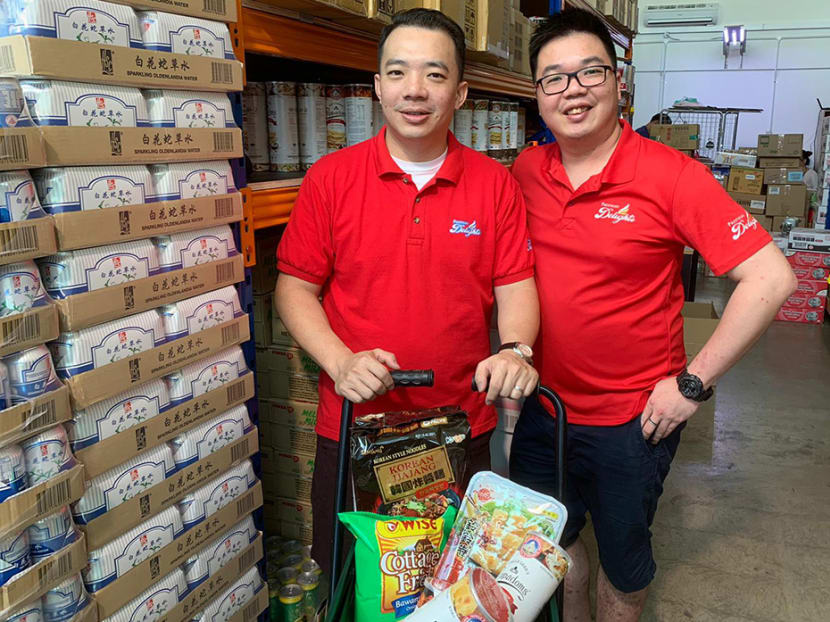Standing out in a crowded (super)marketplace
After a few years helping consumer brands set up their e-commerce teams, Mr Alan Siek decided to set up his own online business at the age of 26. Here's how Prestigio Delights has succeeded in a competitive marketplace.

When Mr Edwin Oh (left) and Mr Alan Siek set up Prestigio Delights, they initially sold fitness equipment on the Lazada e-commerce platform before eventually finding their niche in selling groceries in 2017.
After a few years helping consumer brands set up their e-commerce teams, Mr Alan Siek decided to set up his own online business at the age of 26. Established with Mr Edwin Oh, the business started selling fitness equipment on the Lazada e-commerce platform, but pivoted to selling confectionary items in 2017, and then groceries later that year.
“Confectionary sales were consistent, but we soon reached a plateau and found that we could not hit the sales milestones we had set. So we looked for a more sustainable business, and found our niche selling unique grocery items,” he said.
FROM THE HIMALAYAS TO HAIDILAO
His company, Prestigio Delights, sells products on Lazada that may not be readily available through mainstream channels, and includes items such as Himalayan sweet candy, Haidilao hot-pot soup base and Japanese mochi. These are targeted at a more upmarket clientele.
“My experience helping other companies set up their e-commerce operations has taught me the importance of speed to market. As a start-up, we are more agile than established players. This enables us to source for new innovative products and get them to market quickly,” Mr Siek explained.
The model proved to be a hit, and the business has grown from strength to strength since. Prestigio Delights saw a turning point within a year, selling out a specially curated product in just three minutes during Lazada’s 9/9 campaign in 2018.
That same year, it also received more than 1,000 orders on Singles’ Day. The company now has 2,000 product listings and, with volume growing at a rate of 20 to 30 per cent month-on-month, it crossed the S$1 million revenue mark last year.
Things took a surprising turn earlier this year, when the COVID-19 outbreak and measures aimed at containing it resulted in a spike in demand for online groceries.
Since circuit-breaker measures – requiring Singaporeans to stay at home unless absolutely necessary – were put in place, Prestigio Delights has seen its orders surge by over 200 per cent. To cope with demand, the company has had to triple its workforce.
CONVINCING THE SCEPTICS
Despite its rapid success, Prestigio Delights has found it challenging at times to persuade traditional brands to be sold on its digital store. “There is a pool of suppliers who are still very traditional and sceptical of going online, especially as the online groceries segment is only a few years old. We have to convince them that they could increase their sales by selling their products online,” said Mr Siek.
It helps that Prestigio Delights is on the Lazada platform, which enjoys brand-name recognition and a solid track record. For instance, according to iPrice’s The Map of E-commerce in Singapore, Lazada had the highest number of monthly web visits among Singapore's leading e-commerce players in the fourth quarter of 2019.
“Lazada has helped to uplift many sellers. It also has a strong premium customer base, which is our target market. We are seeing a loyal group of customers who shop with us regularly,” said Mr Siek.
HELPING SELLERS SUCCEED
Prestigio Delights makes use of the marketing resources Lazada offers its sellers. These include free e-commerce-related training courses, analytics tools that can generate customer insights, as well as loyalty programmes such as e-vouchers.
Business Advisor, a data insights tool, allows sellers on Lazada to monitor the performance of the items they sell and adjust their offerings accordingly. To foster customer loyalty, merchants can bundle products to make them cheaper, or issue vouchers to encourage shoppers to return.
In January, Prestigio Delights took advantage of a tool called LazLive, which enabled the company to live stream a session with a key opinion influencer discussing the company’s products and engaging with customers. The one-hour event generated sales that were 300 per cent higher than their daily average.
MENTORING OTHER SELLERS
Despite the COVID-19 situation, Mr Siek is optimistic about the company’s future and hopes to help other online retailers. As one of Lazada’s better performers, he acts as an ambassador for the platform, conducting training sessions for newer sellers and helping to foster a sense of community.
He plans to expand Prestigio Delights’ product mix while staying at the premium end of the market. The company’s customers can expect to see items such as wagyu beef and Japanese-branded baby food on its virtual shelves soon.
Said Mr Siek: “We are looking to add more high-quality household items such as shampoo or baby food.”
Enterprise Singapore, in partnership with e-commerce players including Lazada Singapore, announced the Singapore E-Commerce Programme, which helps SME retailers with little or no online selling experience set up their e-commerce operations.
With the subsidies, Lazada can offset up to 90 per cent of the costs for first-time online sellers, up to S$9,000. You can also sign up to be a seller on Lazada here.









